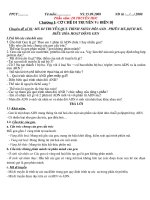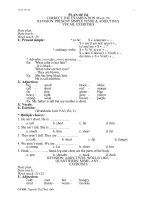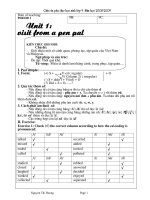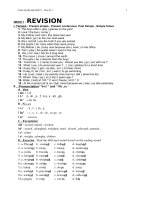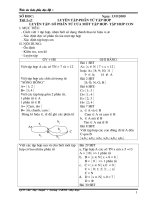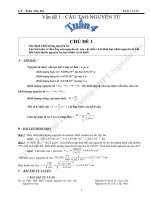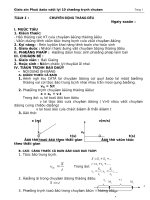Bài giảng Giáo án phụ đạo
Bạn đang xem bản rút gọn của tài liệu. Xem và tải ngay bản đầy đủ của tài liệu tại đây (265 KB, 22 trang )
Phụ đạo Tiếng Anh 8 Trần Văn Dư
Week: 22 Preparing date: 10/ 1 / 2011
Period: 11,12 Teaching date: 12 / 1 / 2011
REVISION
PASSIVE FORM IN PRESENT AND FUTURE SIMPLE
I. Objective :
After finishing this lesson, students will be able to form the passive in the present
simple and in the future.
II. Language contents :
- Grammar:
- Passive form in the present simple and in the future.
III. Techniques :
- Gap – filling.
IV. Teaching aids :
- Word sheet (exercises).
V. Procedure :
Phụ đạo Tiếng Anh 8 Trần Văn Dư
STEPS ACTIVITIES
Review Ask students to repeat the passive form in the present simple.
Form: Passive form in the Present Simple.
HOW TO CHANGE INTO PASSIVEFORM
Active: S + V + O
Passive: S+ tobe + PP + by O
Practice
Good
students
- Ask students to rewrite the sentences in the passive form.
I. Turn the following sentences into passive form:
1. Break the glass into small pieces.
2. Then wash the glass with a detergent liquid.
3. Dry the glass pieces completely.
4. Mix them with certain specific chemicals.
5. Melt the mixture until it becomes a liquid.
6. Use a long pipe, dip it into the liquid, then blow the liquid into
intended shapes.
- Teacher corrects if necessary.
→Answer key:
1. The glass is broken into small pieces.
2. Then the glass is washed with a detergent liquid.
3. The glass pieces are dried completely.
4. They are mixed with certain specific chemicals.
5. The mixture is melted until it becomes a liquid.
6. A long pipe is used. It is dipped into the liquid, then the liquid is
blown intended shapes.
II. Put the verbs in brackets into the passive to complete the text:
In industry, most glass (1) _____________ (recycle), but ordinary
people are often too lazy to do this. They throw their bottles away, and the
bottles (2) _____________ (take) to the dump. It is difficult for workers on
the dump to separate glass from other waste. That is why there are “bottle
banks” to encourage people to recycle glass. The glass (3) _____________
(collect) and (4) _____________ (take) to the factory. There it (5)
_____________ (break) up, (6) _____________ (melt) and (7)
_____________ (make) into new bottles.
- Teacher corrects if necessary.
→Answer key:
1. is recycled 2. are taken 3. is collected
3. is taken 5. is broken 6.is melted
7. is made
Subject + is/am/are + past participle.
Phụ đạo Tiếng Anh 8 Trần Văn Dư
Homework:
- Do the sentences that they haven’t done in class.
- Prepare and review “passive in the future simple tense”
VI/ self-valuation:
…………………………………………….………………………………………
…………………………………………..…………………………………………
…………………………………………………..…………………………………
Week : 23 Preparing date: 12 / 1 / 2011
Period: 13,14 Teaching date : 19 / 1 / 2011
REVISION
Passive form in the future.
I. Objective :
After finishing this lesson, students will be able to form the passive in the future.
II. Language contents :
- Grammar:
- Passive form in the future.
III. Techniques :
- Gap – filling.
IV. Teaching aids :
- Word sheet (exercises).
V. Procedure :
STEPS ACTIVITIES
Phụ đạo Tiếng Anh 8 Trần Văn Dư
Review
- Ask students to repeat the passive form in the future.
- Form: Passive form in the future.
Practice
Good
students
- Ask students to rewrite the sentences in the passive form.
I. Use the diary to say when these jobs will be done.
Monday Tuesday Wednesday Thursday Friday
A.M. clean floor repair
work
paint the
living
room
P.M wash dishes Write report arrange
meeting
type
letter
1. The floor will be cleaned on Monday morning
2. The dishes__________________________________.
3. The work___________________________________.
4. The report___________________________________.
5. The meeting_________________________________.
6. The living room_______________________________.
7. The letters____________________________________.
Teacher corrects if necessary.
→Answer key:
1. The floor will be cleaned on Monday morning.
2. The dishes will be washed on Monday afternoon.
3. The work will be repaired on Tuesday morning.
4. The report will be written on Wednesday afternoon.
5. The meeting will be arrange on Thursday afternoon.
6. The living room will be painted on Friday morning.
7. The letters will be typed on Friday afternoon.
II. Rewrite the sentences, use the verbs in passive form :
1. The Prime Minister will open the new hospital.
2. He will tidy the room soon.
3. People will melt the small glass pieces under great heat.
4. We will send tickets to you next week.
5. People won’t speak English at the conference.
6. People will build a new library behind the police station.
Subject + will / shall + be + past participle.
Phụ đạo Tiếng Anh 8 Trần Văn Dư
- Teacher corrects if necessary.
→Answer key:
1. The new hospital will be opened by the Prime Minister.
2. The room will be tidied soon.
3. The small glass pieces will be melted under great heat.
4. These tickets will be sent to you next week.
5. English won’t be spoken at the conference.
6. A library will be built behind the police station.
Homework:
- Review the other tense in the passive form.
- Prepare to review “ do/would you mind …”
VI/ self-valuation:
…………………………………………….………………………………………
…………………………………………..…………………………………………
…………………………………………………..…………………………………
Week : 24 Preparing date: 14 / 2 / 2009
Period: 23 Teaching date : 16 / 2 / 2009
REVISION
“Would/Do you mind” form
I/ Objectives: Review the form of the request “Would / Do you mind…”.
II/ Language content: Would you mind + V_ing
Would you mind + If + S + V(ed/V
II
)
Do you mind + V_ing
Do you mind + If + S + V(inf)
III/ Techniques: guiding, practical
IV/ Procedures:
STEPS CONTENTS
Review Model sentences:
Use: To make and respond to formal requests.
Form: Would you mind / Do you mind + V_ing
Phụ đạo Tiếng Anh 8 Trần Văn Dư
Practice
For good ss
Would you mind + If + S + V(ed/V
II
) ( past simple tense)
Do you mind + If + S + V(inf) ( present simple tense)
Responses:
Agreement: No, I don’t mind / No, of course not / Not at all /
Please do / Please go ahead.
Disagreement: I’m sorry I can’t / I’m sorry. It’s impossible
I’d prefer you didn’t / I’d rather you didn’t
Meaning : Xin bạn cảm phiền …
EXERCISES
I. Mapped dialogue:
You Tourist officer
Excuse me
I’d like to visit a market.Would
you mind suggesting one?
That sounds interesting. Thank
you.
Yes?
Not at all.
How about going to Thai Binh
Market? It opens from about 5.
am to 8. pm
II. Use“ Would/Do you mind….? “ to make the folowing sentences
more polite:
1. Shall I sit here?-
- Do……………………………………..……..……..?
2. May I ask you a question?
- Would…………………………………….………….?
3. Could I turn the air conditioner off?
- Would………………………..………….……………?
4. Can I use your hand phone?
- Do…………………………………………………….?
5. Could I borrow your newspaper?
- Would…………………………….………………….?
Homework:
- Review the responses of the requests
- Prepare to review “ tenses in English …”
VI/ self-valuation:
Phụ đạo Tiếng Anh 8 Trần Văn Dư
…………………………………………….………………………………………
…………………………………………..…………………………………………
…………………………………………………..…………………………………
Week : 25 Preparing date: 20 / 2 / 2009
Period: 24 Teaching date : 23 / 2 /2009
REVISION
LESSON 1: THE PRESENT PERFECT + EXERCISES
I/ Objectives: Review the form and usage of the present perfect tense.
II/ Language content: The present perfect tense
III/ Techniques: guiding, practical
IV/ Procedures:
STEPS CONTENTS
Review
grammar
points
1. Form: - Affirmative: S + has/have +V3/ed….
- Negative: S + has/have + not + V3/ed…..
- Interrogative: Has/Have + S + V3/ed….?
I, We, You They : have
He, She, It : has
2. Use:
a. Thì hiện tại hoàn thành diễn tả một hành động trong quá khứ mà còn
Phụ đạo Tiếng Anh 8 Trần Văn Dư
Practice
For
good ss
liên quan đến hiện tại hoặc tương lai. (never, ever, not…yet, since, for, so
far, until now, up to now, …….)
Ex: We have learnt English for 5 years.
b. Diễn tả một hành động vừa mới xẩy ra(just, recently, lately).
Ex: She has just gone out.
c. Diễn tả một hành động xẩy ra trong quá khứ không xác định thời
gian
(already, before).
Ex: Have you seen this movie before?
3. Notes:
a. Cách dùng của “since và for”:
- SINCE: Đứng trước một mốc thời gian (2000, September, I last
saw you, …)
- FOR: Đừng trước (3 months, a long time, ages, …)
b. Cách dùng của “yet”:
- YET: Dùng trong câu phủ định và câu nghi vấn
Ex: We haven’t done our exercise yet.
c. Các trạng từ: never, ever, just, (has/ have) (V3/ed).
Ex: I have already finished my homework.
EXERCISES
I. Fill in the blanks with “Since or For”:
1. My sister (be) ……………….. a student ............ two years.
2. We (live)……………….. here................. 1999.
3. I (not, see) ………………………. Linh.............. my birthday party.
4. She (be)………………………. away............... five days.
5. They (already, wait)......................... .......... a year.
6. They (be) ………………………….there........... a few minutes.
7. That building (build)………………….. there........... 18
th
century.
8. My brother ( know)…………………….them................. many years.
9. I ( write/not)…………………….. to my uncle........... July.
10. He ( do)……………………………… his homework............... an
hour.
II. Find and correct the mistakes:
a) My man and I have been married for ten years
b) I stayed with my aunt what lives in Paris
c. We did not seen Peter for long
d. Tom has studied in London for 1998
e. Where have you been on holiday last year?
f. We’ve had this car since five year
g. She hasn’t finished her work already
III. The present perfect tense with “Yet” and “already”
1. We haven’t done the homework ( yet)
2. She hasn’t returned ( yet)
